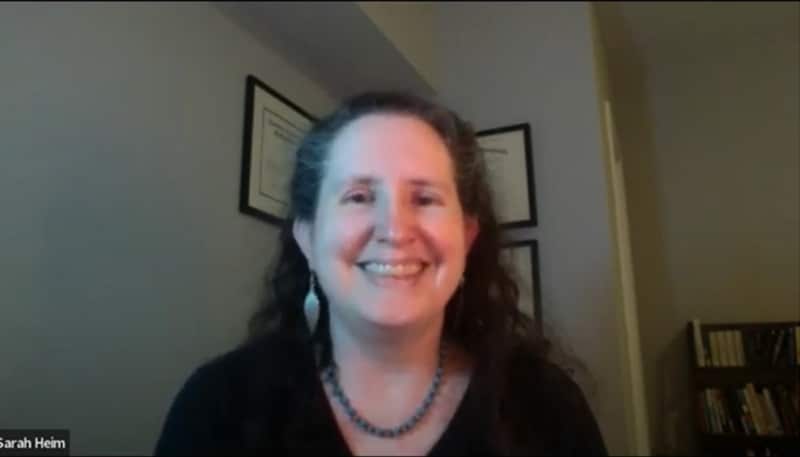Sarah Heim Delivered the 2022 Women’s History Month Lecture
Cornelia King, Chief of Reference and Curator of Women’s History
For our Women’s History Month lecture on March 10, Sarah Heim (former Director of Research Services at the Historical Society of Pennsylvania) spoke about the diary of Elizabeth Drinker, which Drinker kept from 1758 to 1807. The diary is one of the most heavily used primary sources related to daily life in Philadelphia before, during, and after the American Revolution.
The diary remained in the possession of the family before descendants gifted it to the Historical Society in 1955. Late 19th- and early 20th-century historians did have access to the extracts selected by Henry Drinker Biddle that appeared in a volume Lippincott’s published in 1889. Typical for the period, they focused on the occasions that Elizabeth Drinker writes about Founding Fathers, most notably her visit to Valley Forge to meet with George Washington to ask him to intercede with the Continental Congress on behalf of her husband Henry Drinker (and the husbands of other women who accompanied her). At the time, these men were imprisoned in Virginia after they failed to sign oaths of loyalty because of their Quaker convictions.
Another Drinker descendant, Cecil K. Drinker, used Elizabeth Drinker’s diary for his 1937 book about medical practices in Colonial Philadelphia. Notably, he quoted Elizabeth’s description of Dr. John Redman inoculating her son William in 1769 by inserting pus subcutaneously in the child’s leg. Twenty years later, Whitfield J. Bell utilized Cecil’s work to make the point that Dr. Redman had been unjustly neglected by medical historians, many of whom focused on Dr. Benjamin Rush as Colonial Philadelphia’s leading physician.
The breakthrough for historians studying Elizabeth Drinker’s diary as a source on Elizabeth herself came in the 1970s, with the advent of women’s history as an academic discipline. Especially note Carroll Smith-Rosenberg’s 1973 article “Puberty to Menopause” (Elizabeth experienced menopause as a release, after many years of childbearing) and Linda Kerber’s 1980 book Women of the Republic (Elizabeth’s leisure reading in later life shows her freedom to express her individuality in her choice of reading matter).
Today, most people gain access to the text of Elizabeth Drinker’s diary in Elaine Forman Crane’s excellent three-volume transcription, with its extraordinarily detailed index, which Northeastern University Press produced in 1991. This was the result of a monumental project over many years, and makes the text accessible in libraries around the world.
Sarah Heim ended her lecture with the suggestion that the text of Elizabeth Drinker’s diary could become the framework for a hypertext project, to create an even fuller understanding of the life and times of Elizabeth Drinker.
The recording of the full talk is available here:
Sarah Heim also provided this bibliography of the works she noted in her talk:
PUBLICATIONS OF THE DIARY (in chronological order)
Biddle, Henry Drinker. Extracts from the Journal of Elizabeth Drinker: From 1759 to 1807, A.D. Philadelphia: Lippincott, 1889. https://archive.org/details/extractsfromjou00dringoog/page/n3/mode/2up
Drinker, Cecil Kent, 1887-1956. Not So Long Ago: A Chronicle of Medicine and Doctors in Colonial Philadelphia. New York: Oxford University Press, 1937.
Drinker, Elizabeth Sandwith, and Elaine Forman Crane. The Diary of Elizabeth Drinker. Boston: Northeastern University Press, 1991. (3 volumes)
Drinker, Elizabeth Sandwith, and Elaine Forman Crane. The Diary of Elizabeth Drinker: The Life Cycle of an Eighteenth-Century Woman. Boston: Northeastern University Press, 1994. (reissued with a new introduction by the University of Pennsylvania Press in 2010)
SCHOLARLY WORKS DRAWING ON THE DIARY (in chronological order)
Baker, William S. “Itinerary of General Washington from June 15, 1775, to December 23, 1783 (Continued).” The Pennsylvania Magazine of History and Biography 14, no. 4 (1891a): 335-363, http://www.jstor.org/stable/20083389.
———. “Itinerary of General Washington from June 15, 1775, to December 23, 1783 (Continued).” The Pennsylvania Magazine of History and Biography 15, no. 3 (1891b): 291-320, http://www.jstor.org/stable/20083428.
Bell, Whitfield J. “John Redman, Medical Preceptor, 1722-1808.” The Pennsylvania Magazine of History and Biography 81, no. 2 (1957): 157-169, http://www.jstor.org/stable/20088964.
“Paint Color Research and House Painting Practices.” Newsletter of the Association for Preservation Technology 1, no. 2 (1969): 5–20.
Smith-Rosenberg, Carroll. “Puberty to Menopause: The Cycle of Femininity in Nineteenth-Century America.” Feminist Studies FS. 1, no. 3 (1973): 58–72.
Kerber, Linda. Women of the Republic : Intellect and Ideology in Revolutionary America. Chapel Hill : The University of North Carolina Press, 1980.
Hirsh, Alison Duncan. “Uncovering “the Hidden History of Mestizo America” in Elizabeth Drinker’s Diary: Interracial Relationships in Late-Eighteenth Century Philadelphia,” Pennsylvania History 68, no. 4, Autumn 2001: 483-503.
Miller, Marla R. Betsy Ross and the Making of America. New York: Henry Holt, 2010.
Godbeer, Richard World of Trouble: A Philadelphia Quaker Family’s Journey through the American Revolution. New Haven: Yale University Press, 2019



